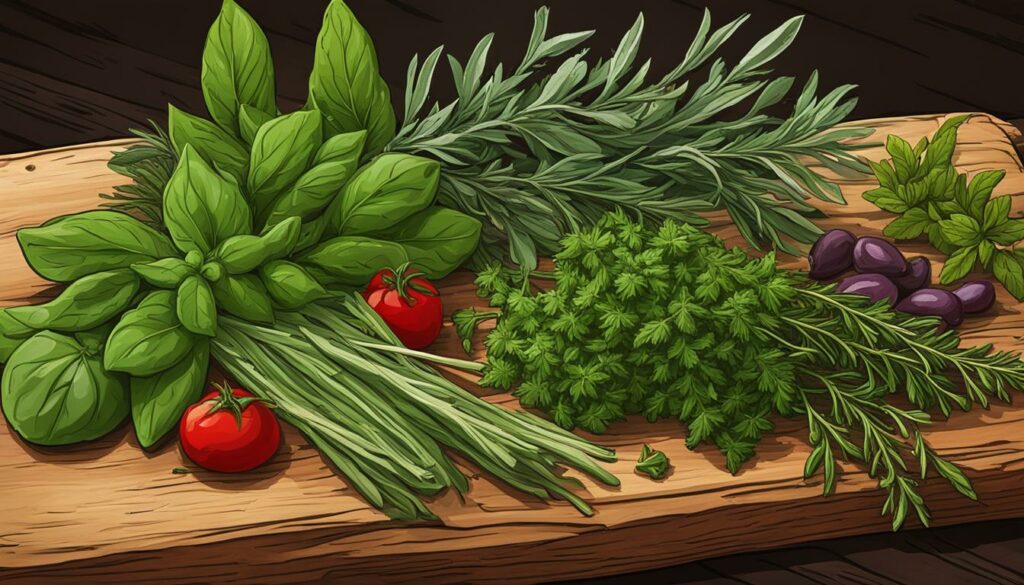Herbs have been valued for centuries for their healing properties and flavorful presence in cooking. They have been used in various cultures as herbal remedies, bringing natural benefits to health and wellness. Through modern research, evidence has been found for the numerous health benefits of herbs. Let’s explore the top uses of herbs for both health and culinary purposes.
Herbal Remedies for Health and Wellness
Many herbs contain medicinal properties that can be utilized as natural remedies for various health conditions. Incorporating these herbal remedies into your routine can provide numerous benefits for your overall well-being.
Cinnamon: Known for its ability to lower blood sugar levels and improve insulin sensitivity, cinnamon can be beneficial for diabetic patients.
Sage: This herb has shown promising effects on brain function and memory, particularly in individuals with Alzheimer’s disease.
Peppermint: Peppermint has been proven to relieve pain and reduce abdominal bloating in those with irritable bowel syndrome (IBS).
Turmeric: With its active compound curcumin, turmeric exhibits powerful anti-inflammatory effects. It has been linked to improved brain function, reduced risk of heart disease and cancer, and relief from arthritis.
Holy Basil: This herb boosts immunity and inhibits the growth of bacteria, yeasts, and molds.
Cayenne Pepper: Containing capsaicin, cayenne pepper can help reduce appetite and potentially combat certain forms of cancer.
Ginger: Known for its anti-nausea properties and strong anti-inflammatory effects, ginger is a versatile herb with numerous health benefits.
Fenugreek: Fenugreek has been shown to improve blood sugar control, making it beneficial for individuals with diabetes.
Rosemary: This herb has anti-inflammatory effects that can help prevent allergies and nasal congestion.
Garlic: Garlic has been used throughout history for its medicinal properties, known to combat sickness and improve heart health.

Incorporating these herbal remedies into your lifestyle can provide natural ways to support your health and wellness. Whether used as supplements, teas, or included in your cooking, harness the power of herbs to enhance your overall well-being.
Culinary Uses of Herbs
In addition to their medicinal properties, herbs are widely used in cooking to enhance the flavor and aroma of various dishes. Some popular culinary herbs include basil, thyme, rosemary, parsley, oregano, and mint. These herbs can be used in both fresh and dried forms to add depth and complexity to recipes.
Basil: A staple in Italian cuisine, basil adds a fresh and aromatic element to dishes like pasta, salads, and sauces.
Thyme: Commonly used in stews, soups, and roasted meats, thyme provides a warm and earthy flavor.
Rosemary: Pairs well with roasted vegetables, potatoes, and meats, adding a fragrant and piney taste.
Parsley: Often used as a garnish or added to salads for a fresh and vibrant element.
Oregano: A key ingredient in Italian and Mediterranean dishes, oregano imparts a robust and slightly bitter flavor.
Mint: Commonly used in both sweet and savory dishes, mint brings a refreshing and cool sensation.
Incorporating these culinary herbs into your cooking not only adds dimension to your meals but also provides potential health benefits.

| Herb | Culinary Uses |
|---|---|
| Basil | Pasta, salads, sauces |
| Thyme | Stews, soups, roasted meats |
| Rosemary | Roasted vegetables, potatoes, meats |
| Parsley | Garnish, salads |
| Oregano | Italian and Mediterranean dishes |
| Mint | Sweet and savory dishes |
Conclusion
Herbs offer a multitude of uses for both your health and culinary creations. By incorporating herbs into your lifestyle, you can experience a wide range of benefits. Whether you’re seeking natural remedies to boost your well-being or looking to add zest and flavor to your dishes, herbs are the perfect solution.
Consider starting your own herb garden to have a readily available supply of fresh herbs at your fingertips. Not only will this elevate your culinary experiences, but it also presents an opportunity to experiment with herbal remedies and enhance your overall health.
Take the time to explore the various uses of herbs and discover their potential to improve your health and cooking endeavors. From adding a burst of freshness with culinary herbs to harnessing the healing properties of herbs for well-being, the possibilities are endless. Embrace the natural boost and endless flavor possibilities that herbs can offer and elevate your health and culinary adventures!
FAQ
What are the health benefits of using herbs?
Herbs have been valued for centuries for their healing properties. They offer a wide range of health benefits, including improved blood sugar control, brain function, pain relief, immune boosting, reduced inflammation, and prevention of heart disease and cancer, among others.
How can herbs be used as natural remedies?
Many herbs contain medicinal properties that can be utilized as natural remedies for various health conditions. For example, cinnamon can help lower blood sugar levels and improve insulin sensitivity, sage has shown positive effects on brain function and memory, and peppermint can relieve pain and reduce abdominal bloating in individuals with irritable bowel syndrome (IBS).
What are the most popular culinary herbs and their uses?
Some popular culinary herbs include basil, thyme, rosemary, parsley, oregano, and mint. Basil adds a fresh and aromatic element to dishes like pasta and salads, thyme provides a warm and earthy flavor to stews and soups, rosemary adds a fragrant and piney taste to roasted vegetables and meats, parsley is often used as a garnish or added to salads for a fresh element, oregano imparts a robust and slightly bitter flavor to Italian and Mediterranean dishes, and mint brings a refreshing and cool sensation to both sweet and savory dishes.
How can I incorporate herbs into my cooking?
Herbs can be used in both fresh and dried forms to enhance the flavor and aroma of various dishes. They can be added during cooking or used as a garnish. You can experiment with different herbs in recipes for soups, salads, pasta, meats, and vegetables to add depth and complexity to your meals.
How can I start an herb garden?
Starting an herb garden is a great way to have easy access to fresh herbs for cooking and experimenting with herbal remedies. You can grow herbs in pots or plant them in a small garden, either indoors or outdoors, depending on the available space and climate. Some easy-to-grow herbs for beginners include basil, parsley, rosemary, and mint.
What are the general benefits of incorporating herbs into my lifestyle?
Incorporating herbs into your lifestyle can provide numerous benefits. They can improve the overall well-being with their medicinal properties, elevate the flavor of your dishes, and add potential health benefits. Herbs are natural, flavorful, and can enhance your health and cooking endeavors.
Source Links
- https://www.healthline.com/nutrition/10-healthy-herbs-and-spices
- https://www.betterhealth.vic.gov.au/health/healthyliving/herbs
- https://www.aarp.org/health/healthy-living/info-2022/fresh-herb-health-benefits.html

